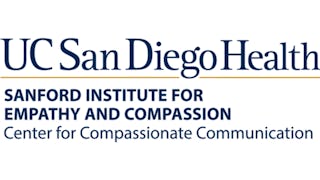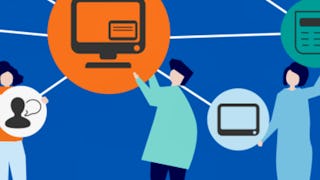This course explores effective communication strategies for healthcare professionals to enhance teamwork and patient care. Learners will reflect upon giving and receiving feedback, managing emotions, addressing microaggressions, and handling conflict in the workplace. Through real-world scenarios, nurses learn to build trust, foster collaboration, and communicate with empathy across interdisciplinary teams.

New! Discover how 91% of learners achieved at least one positive career outcome. Learn more.


Recommended experience
What you'll learn
Demonstrate effective communication techniques in healthcare settings.
Describe strategies for giving and receiving constructive feedback.
Manage difficult conversations and workplace conflict with professionalism.
Promote collaboration and empathy within the interdisciplinary healthcare team.
Skills you'll gain
Details to know

Add to your LinkedIn profile
October 2025
6 assignments
See how employees at top companies are mastering in-demand skills

There are 2 modules in this course
This module introduces students to essential communication principles that support effective healthcare interactions and professional relationships. Students will explore the critical role of communication in healthcare settings, learning to clarify expectations, recognize common cognitive biases like the fundamental attribution error, and engage in proactive conversations that prevent misunderstandings. The module emphasizes the purpose and delivery of constructive feedback, including strategies for navigating emotionally charged situations and managing heated emotions professionally. Students will examine practical frameworks such as the Greaser Approach for difficult conversations, understand the importance of relational feedback in building trust, and learn about the Love Letter Effect in written communication. Through this introduction, learners will develop core communication competencies necessary to foster collaborative relationships, address conflicts constructively, and maintain professionalism in diverse healthcare scenarios.
What's included
10 videos2 readings3 assignments
This module prepares students to navigate complex and difficult communication scenarios commonly encountered in healthcare environments. Students will explore how to recognize and address microaggressions in the workplace, manage conflicts with supervisors professionally, and implement strategies to minimize bullying behaviors. The module emphasizes practical approaches for situations when feedback doesn't produce desired results, how to ask for help and feedback effectively, and the importance of active listening in professional interactions. Students will learn techniques for receiving feedback constructively, communicating effectively during interdisciplinary exchanges, and maintaining professionalism under challenging circumstances. Through this comprehensive exploration, learners will develop the resilience and communication skills necessary to handle sensitive situations, advocate for themselves and others, and contribute to a respectful and collaborative healthcare culture.
What's included
10 videos2 readings3 assignments
Instructor

Offered by
Explore more from Healthcare Management
 Status: Preview
Status: PreviewUniversity of California San Diego
 Status: Preview
Status: PreviewUniversity of Michigan
 Status: Free Trial
Status: Free TrialJohns Hopkins University
 Status: Free Trial
Status: Free TrialArizona State University
Why people choose Coursera for their career





Open new doors with Coursera Plus
Unlimited access to 10,000+ world-class courses, hands-on projects, and job-ready certificate programs - all included in your subscription
Advance your career with an online degree
Earn a degree from world-class universities - 100% online
Join over 3,400 global companies that choose Coursera for Business
Upskill your employees to excel in the digital economy
Frequently asked questions
To access the course materials, assignments and to earn a Certificate, you will need to purchase the Certificate experience when you enroll in a course. You can try a Free Trial instead, or apply for Financial Aid. The course may offer 'Full Course, No Certificate' instead. This option lets you see all course materials, submit required assessments, and get a final grade. This also means that you will not be able to purchase a Certificate experience.
When you enroll in the course, you get access to all of the courses in the Specialization, and you earn a certificate when you complete the work. Your electronic Certificate will be added to your Accomplishments page - from there, you can print your Certificate or add it to your LinkedIn profile.
Yes. In select learning programs, you can apply for financial aid or a scholarship if you can’t afford the enrollment fee. If fin aid or scholarship is available for your learning program selection, you’ll find a link to apply on the description page.
More questions
Financial aid available,


